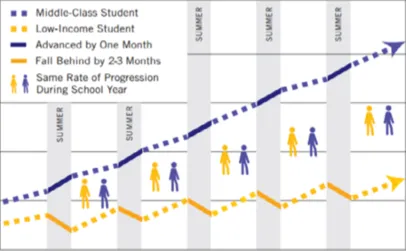Fighting Summer Learning Loss
July 22, 2022
 By:
Kaitlyn Harvie
By:
Kaitlyn Harvie
Those lengthy summer breaks are great for checking in on one’s mental health but also leads to educations biggest enemy, summer learning loss. So, what is “summer learning loss”, the “summer slide”, and “brain drain”? In short, these terms refer to the potential decline in student’s ability to retain material taught in the most recent academic year. It is cumulative and leads to years’ worth of material lost. Students aren’t in school routines providing structure, social interaction, and access to the same resources as their peers, also knows as the “resource faucet”.
The lack of access to books and summer activities jump starts about two to three months of lost academics over the summer. This is even more prevalent in low-income homes. Low-income students are around three grade levels behind higher-income students in reading by the end of fifth grade because of summer learning loss. About 2 months of reading skills and 2 ½ months of math skills can jump out of student’s heads in a single summer. Put into perspective, that’s about 2 years of learning lost to the summer slide by middle school (See Image Above). In 2020, researchers put together a study documenting student learning patterns in the summertime. “School’s out: The role of summers in understanding achievement disparities,” found that the average student loses 17-34% of the prior year’s information absorption during summer break. “ECLS-K:2011 research indicates student learning flattens during the summers after kindergarten and first grade, while research using MAP Growth data shows more substantial losses in both math and reading” (nwea).
But the biggest issue is informing students and parents of this and educating them on how to be aware of this, plan to avoid it, and follow through with steps to combat potential loss of previous years’ academic learning. . While making time in the summer to practice reading, math, comprehension, and grammar skills sound easy, often your kids are going to run right passed you to the backyard. To curb summer learning loss, try to make learning fun in the summertime with these 7 learning tricks.
1. Stimulating their minds with musical instruments - enhances verbal memory, spatial reasoning, literacy skills, teaches patience, math skills, and so much more!
2. Encouraging thoughtful play - this can help kids learn in a way that they find fun and engaging. There are many activities such as sand play that provides a foundation for scientific learning and physical development.
3. Let your kids choose 3 books for the summer - studies find that kids tend to choose books that are below their reading level. So, make sure that your child is choosing reading material that introduces new words and ideas to keep them challenged! But allowing your kids to choose will excite them about reading their favorite subjects and promote learning about other topics that interest them.
4. Crosswords and word searches - this is can be a great weapon for battling summer learning loss! Riddles, crosswords, and word searches will tap into your child’s critical-thinking and problem-solving skills while also working on literacy skills.
5. Focus on developing summer routines - keeping summer routines can help students create new ways of thinking, perceiving, and feeling. Routines in the summer can also tie all tools against summer learning loss together.
6. Use Kendall Hunt’s free education resources - take advantage of Flourish Free Resources to support students learning environments. Work on reading, math, science, and religious topics with Kendall Hunt’s tips, tools, activities, refreshers, and more!
7. Take trips to museums and zoos! - by engaging in hands-on activities students will be able to learn more through interpretation. One study shows visiting exhibits where parents ask open ended questions allows students to think and interpret what they experience and learn from it.
No matter how you choose to combat summer learning loss, it's important to select something that students, educators, and parents are passionate and involved in.
